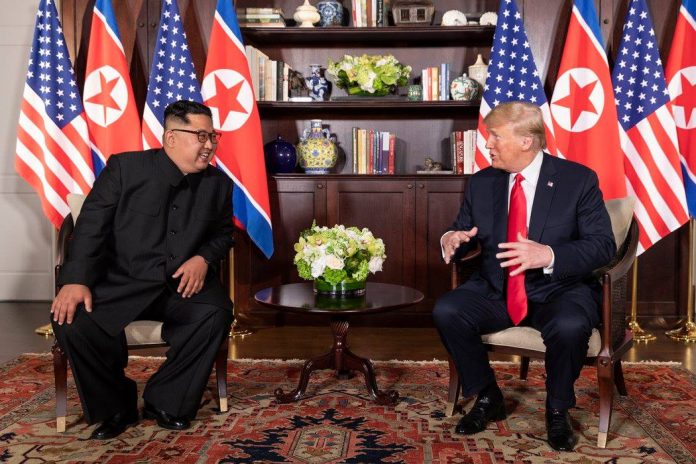Optimistic Moon and ambitious Trump have to face the realities of their own domestic issues and North Korea’s changing rhetoric, on top of a global pandemic.
Undoubtedly, COVID-19 pandemic has a profound impact on Inter-Korean ties. The past 2 years’ negotiation between North Korea and South Korea, also with the United States, have not shown any positive results and is disrupted by the pandemic. North Korean leaders have even appeared with a worsening tone of diplomacy.
December last year, Chairman Kim Jong-un stated that if the U.S. continues its hostile policy toward the DPRK, there will never be denuclearization on the Korean Peninsula. He added that the DPRK will steadily develop necessary and prerequisite strategic weapons for the security of the state, signalling their unwillingness to wait longer.
Besides having to deal with a pandemic, the two Koreas were also victims of a disastrous monsoon. South Korea offered humanitarian aid to its neighbour, but the outreached hand was shunned by Kim Jong-un, who ordered North Korean officials not to accept international aid on the ground that it might bring COVID-19 as well.
This rejection can be explained by Juche, the state’s ideology of self-reliance that serves as a free pass to all kinds of mishaps that fall upon the regime. Foreign aid is politicized because it would ruin the image of North Korea as a self-sufficient nation in the eyes of its people and the international community.
In the first half of this year, the world also saw Kim Yo-jong’s rise to power in her brother’s absence. Her strong statements on both the United States and South Korea and punitive measures towards the South raised concerns about the future of the peace process. While Kim Jong-un has recently delegated some of his authority to her sister, her exact role and influence over the regime remain a wildcard.
Whereas his initial response to the pandemic gained praises, South Korean President Moon Jae-in is facing domestic criticism as the economy falls into a recession. A second COVID-19 wave and provocations by North Korea made it more difficult for him to rally support. After his plans to revive the Kaesong Industrial Complex and tourism to Mount Keumgang were put on hold, Moon sought to salvage inter-Korean relations by reshuffling the national security team with figures who have been closely involved with the North. This move was criticized by his opposition, who deemed him “too pro-North Korean.”
Having only two years left on his non-renewable term, President Moon’s legacy on inter-Korean relations highly depends on North Korea’s response. His liberal predecessors, Kim Dae-jung and Roh Moo-hyun, have failed, and if Moon’s successor is a conservative, all of his current efforts will likely go in vain. Kim Yo-jong’s hostility towards the South might serve as a further hurdle towards any improvement of inter-Korean relations in the near future as Moon loses more domestic support.
Moreover, we must not forget Washington’s role in Inter-Korean peace-making process. The North Korean nuclear issue is regarded as one of President Trump’s foreign policy priorities. However, this time, Trump has arguably lost his focus on the Korean Peninsula due to the fatal impacts of COVID-19, domestic political issues like the Black Lives Matter (BLM) movement, and rising unemployment on top of the upcoming presidential election. Therefore, the DPRK-U.S. relations are inevitably regressing. It would not be surprising if there are no summits in the foreseeable future due to growing mistrust.
The recent global health crisis has heightened tensions between the three main parties. North Korean Foreign Minister recently stated that they will not provide the U.S. any chance to negotiate and accused Trump of only caring about his political achievements. Kim Yo-jong also brought up North Korea’s new rhetoric by saying the theme should be changed from “denuclearization measures versus lifting of sanctions” into a formula of “withdrawal of hostility versus resumption of DPRK-U.S. negotiations” for any future summits to happen.
COVID-19 pandemic has intensified the challenges facing the Inter-Korean peace process. Resuming talks with North Korea become more difficult as new factors emerge. President Moon Jae-in’s time in power will gradually end, Kim Yo-jong’s influence on the regime’s foreign policy decision is expected to grow, and the result of the U.S. election will bring changes to the existing framework.
As President Trump is approaching the end of his term, it is safe to say that the past two years’ diplomatic efforts between the U.S. and North Korea have, for now, fallen into abeyance.
Noto Suoneto is the Director of Special Projects and Institutional Relations of Foreign Policy Community of Indonesia (FPCI) based in Jakarta. He is also the Secretary of China Policy Group and one of the Indonesia-Korea Young Leaders 2019. He was the Secretary of Asian Scholars and Experts Delegation to North Korea in 2018 and currently in charge of East Asian Program and Corporate Policy Brief Program under the FPCI institutional partnership department.
Birgitta Riani is a Korea-related researcher at Foreign Policy Community of Indonesia (FPCI). Her interest is on Korean Peninsula, Inter-Korean and U.S. relations. Brigitta graduated from Ritsumeikan Asia Pacific University in Japan.


